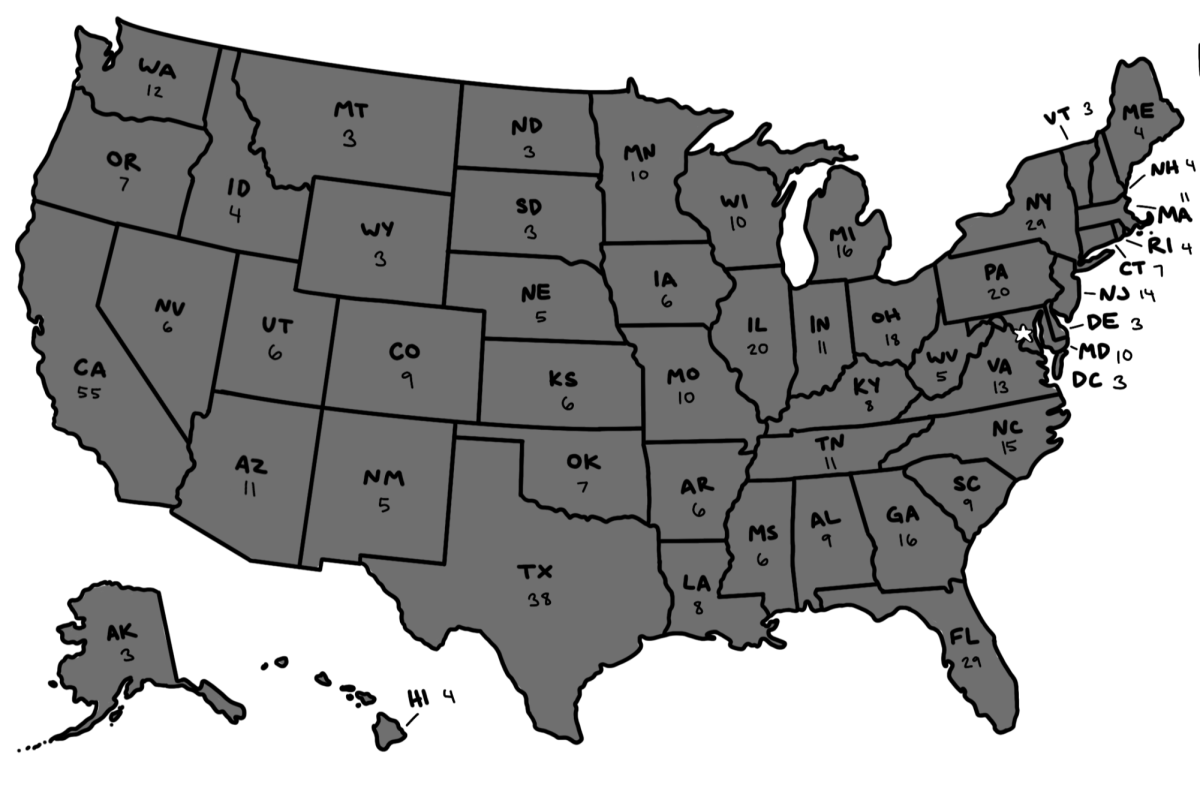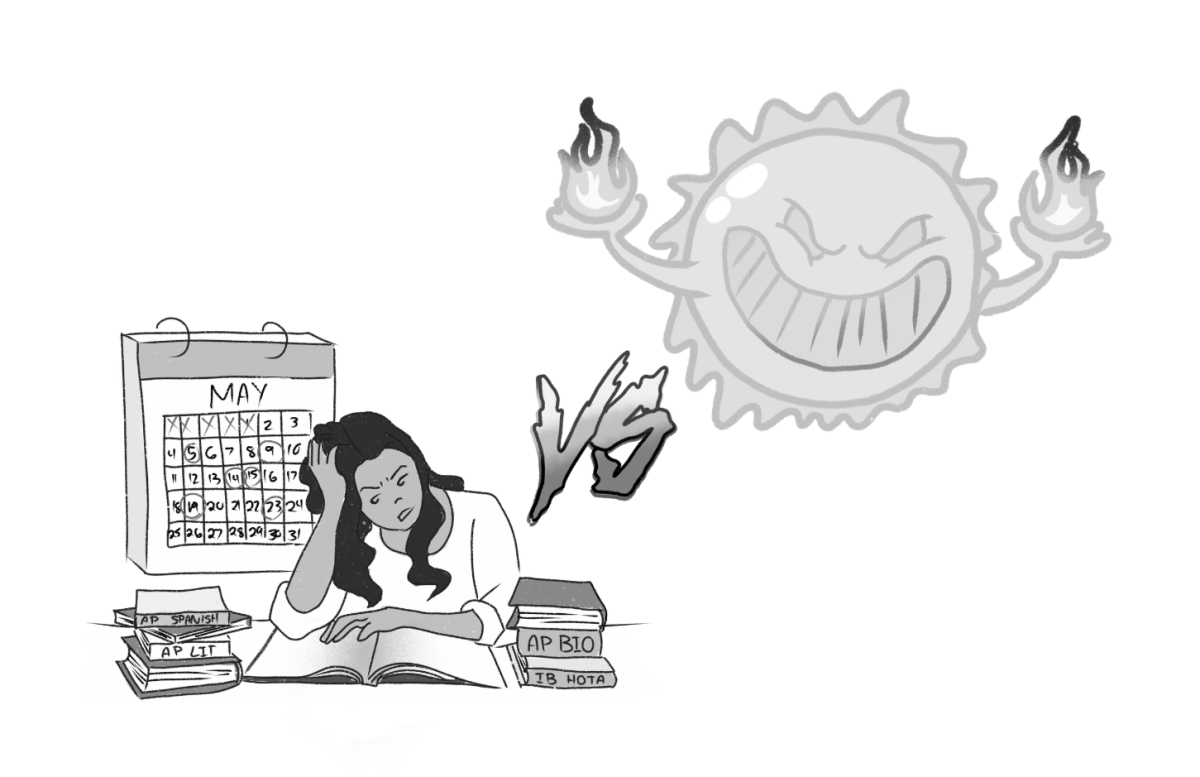Every single American knows about the main process that keeps the government alive: democracy. And in the United States, democracy is held together by a large and complicated web of elections. An American election consists of a group of people voting for a person, law, or subject they want elected, and the candidate with the most votes wins. Seems simple, right? Then how is it that in previous presidential elections, the candidate who had the most total votes has lost the election?
When it comes to the presidential election, the deciding factor of who is elected is much more complicated than who has the most votes. A victor is chosen through a group of presidential electors called the Electoral College. The Electoral College assigns a certain number of votes to each state, the number depending on the population of a given state. For instance, California, with a population of 39 million people, has 54 electoral votes. Comparatively, Colorado has 10 votes with a population of 5.8 million.
The Founding Fathers established the Electoral College in the Constitution, in part, as a compromise between the election of the President by a vote in Congress and the election of the President by a popular vote of qualified citizens. This middle ground was able to please both Congress and the people, and it has stayed the same since. This method of election has its benefits: mainly, states with a smaller population are able to have weight in the election (needed in order to ratify the Constitution), and the votes directly affected the election were educated and informed. Without these benefits, the Electoral College would never have the impact it does today. Unfortunately, it also has its downsides.
One such downside is the fact that a presidential candidate can lose the election even if the majority of people in the country want them to win. In 2016, Hillary Clinton earned 3 million more votes than Donald Trump, but as Trump had more electoral votes, he was elected as the president. This happens because a candidate only needs the majority vote of the state in order to win the state. For example, if candidate 1 were to gain 19 million votes out of the 39 million people in California, they would gain 0 electoral votes. If they got 5 million votes in Colorado out of the 5 million people, then they would get all 10 electoral votes. In this case, candidate 1 would have 24 million people’s votes and 10 electoral votes compared to candidate 2, who would have 20 million people’s votes and 54 electoral votes from California. Despite having 4 million more people’s votes, candidate 1 would lose.
There are several key side effects. One is people thinking their vote does not ‘count.’ People think that their vote does not count because even though they voted for their candidate, if the other one wins the state they voted in, their vote does not affect the election whatsoever. A second is creating importance around “swing states.” Swing states are states that have a roughly equal population of opposing parties, so the state could realistically be won by either candidate during a given election. This may seem like that is the way all states are supposed to be during an election, but because of the Electoral College, the meaning of these states change completely. Since the other non-swing states almost always vote for one political party, they are essentially a guarantee for candidates. This means the candidate should mainly focus on appealing to swing states, as they can win them the election. Neither of these things are inherently bad, but many believe that they are harmful to the democracy of the United States.
The Electoral College is a system tasked with organizing the presidential votes of everybody in the United States, and is responsible for the processes of presidential elections. With the 2024 presidential election upcoming, it is ever more important to understand the specifics with voting. And people must know that in spite of the issues the College has, their vote is important.
Voting in the ’24 presidential election: the Electoral College
Donate to The Wolfpacket
$85
$500
Contributed
Our Goal
Hello there! Our goal is to provide relavent, engaging journalism for readers of all ages. Your donation will support the student journalists of the Wolfpacket at Claremont High School, and will allow us to purchase equipment, print our monthly issues, and enter in journalism competitions. We appreciate your consideration!
More to Discover
About the Contributors

Tavish Brodie, Reporter
Tavish Brodie is a junior at CHS, serving as a Reporter for the Wolfpacket. This is his third year on the staff. Outside of the Wolfpacket, he spends his time serving as Speech and Debate Parliamentary Captain and volunteering at the International Language School for Children and Adults, teaching Spanish, which he has been studying for 8 consecutive years. When he isn’t at work, the academy, or school, he’s out driving with friends and working out or at home playing the drums or watching rally races! After high school, Brodie hopes to become an environmental or patent lawyer, then eventually become a judge. Brodie is nothing but excited to continue serving in the Wolfpacket and publishing articles for you all!

Avery Kurera, Artist
Avery Kurera is a freshman here at CHS. This year she became an artist for The Wolfpacket. For The Wolfpacket she uses a program called Procreate to create her illustrations but also enjoys painting with acrylic paint. Outside of Wolfpacket, Kurera is also a part of ARTstART and has created art for the CUSD website. She began working with The Wolfpacket through her friends Min Cho and Jiseo Park who are both reporters. Avery also spends time playing volleyball, spending time with her friends, and working backstage for the CHS theater. She has had lots of fun creating illustrations for The Wolfpacket and looks forward to making more for hopefully the rest of her high school career!







